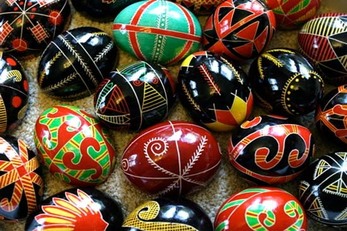
The simple answer - somewhat short version, Christians had long celebrated Sunday as resurrection day, in remembrance of Christ's passion and ascension. Constantine was the Roman Emperor from 306 AD to 337 AD. His mother had adopted Christianity. It is generally accepted that Constantine was a clever opportunist. Christianity's popularity had grown past being able to be suppressed by the Roman Empire. So, Constantine had Christianity legally recognized. He "christianized" common cultural holidays of the time. It was a brilliant political move. The lasting effect on the purity of Christianity is still passionately debated. Constantine continued throughout his lifetime to practice the Roman pagan religion - he worshipped the sun-god "Sol". Constantine was baptized on his deathbed as a Christian, at the request of his mother.
"Pagan roots of Easter - Daily Kos
The March or spring equinox is used as a determinant for what modern Christians celebrate as the holy day of Easter.
As a budding young feminist, I was fascinated with the idea of female symbols of power, and lapped up tales of Eostre (Ostara) along with Aphrodite, Ashtoreth, Demeter, Ishtar, Kali, and Yemaya.
The name 'Easter' originated with the names of an ancient Goddess and God. The Venerable Bede, (672-735 CE.) a Christian scholar, first asserted in his book De Ratione Temporum that Easter was named after Eostre (a.k.a. Eastre). She was the Great Mother Goddess of the Saxon people in Northern Europe. Similarly, the 'Teutonic dawn goddess of fertility [was] known variously as Ostare, Ostara, Ostern, Eostra, Eostre, Eostur, Eastra, Eastur, Austron and Ausos.' Her name was derived from the ancient word for spring: 'eastre.' Similar Goddesses were known by other names in ancient cultures around the Mediterranean, and were celebrated in the springtime." -Denise Oliver Velez, Daily Kos: Pagan roots of Easter
